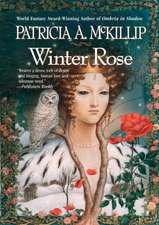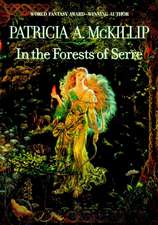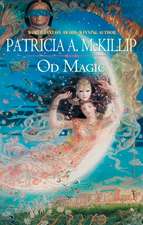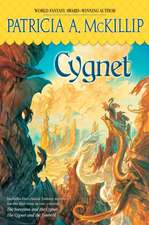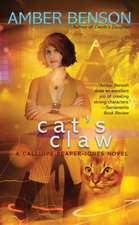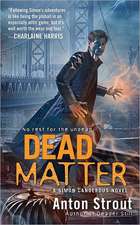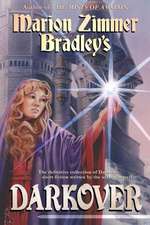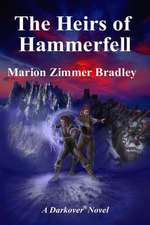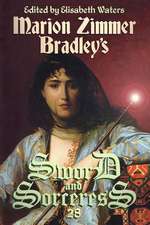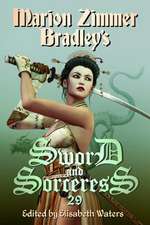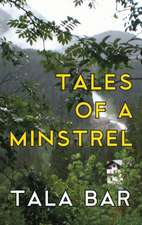The Tower at Stony Wood
Autor Patricia A. McKillipen Limba Engleză Paperback – 30 apr 2001 – vârsta de la 18 ani
Vezi toate premiile Carte premiată
Nebula Awards (2001)
She saw the knight in the mirror at sunset… During the wedding festivities of his king, Cyan Dag, a knight of Gloinmere, is sought out by a mysterious bard and told a terrifying tale: that the king has married a false queen—a lie cloaked in ancient and powerful sorcery. Spurred on by his steadfast honor and loyalty, Cyan departs on a dangerous quest to rescue the real queen from her tower prison, to prevent war, and to awaken magic in a land that has lost its way…
Preț: 125.32 lei
Nou
Puncte Express: 188
Preț estimativ în valută:
23.98€ • 25.04$ • 19.85£
23.98€ • 25.04$ • 19.85£
Carte disponibilă
Livrare economică 14-28 martie
Preluare comenzi: 021 569.72.76
Specificații
ISBN-13: 9780441008292
ISBN-10: 0441008291
Pagini: 304
Dimensiuni: 125 x 204 x 17 mm
Greutate: 0.31 kg
Editura: Ace Books
ISBN-10: 0441008291
Pagini: 304
Dimensiuni: 125 x 204 x 17 mm
Greutate: 0.31 kg
Editura: Ace Books
Recenzii
“The real strengths of the book are the splendor of its imagery, the elegance of its prose, and the character of Cyan, whose own nobility, rather than anything external, holds the key to the success of his quest.”—Booklist
“Mesmerizing and unforgettable—a true flowering of a major talent.”—The Kirkus Reviews
“A new book from the pen of Patricia McKillip is always a thing of beauty, and…The Tower at Stony Wood is no exception…Ms. McKillip is in fine form indeed, creating one of her most appealing heroes and an ambiance of pure enchantment for lucky readers.”—Romantic Times
“An elegant, eloquent fantasy…The Tower at Stony Wood, a beautiful fantasy about the power of story in our lives and how sometimes the purpose of a life is simply to live it, is McKillip at her best, and will only enhance her already impressive reputation.”—Locus
“Filled with beautiful ideas and images…reads like a dream…Patricia A. McKillip is one of the best writers the genre has to offer.”—SF Site
“Patricia A. McKillip weaves words like the lady in the tower weaves thread, making the mundane into a varicolored magical tapestry. Beautiful words and a fantastical story make The Tower at Stony Wood an ever new and always enduring faerie tale…She promises an heroic fantasy, and she more than delivers on her promise.”—BookBrowser
“[McKillip] continues to produce compelling, finely crafted fantasy with an intimacy and lyricism few can match…[Her] latest fantasy presents a complex multi-storied plot which reveals as much about human nature as it does about magic and the truth behind illusions.”—Millenium SF &Fantasy
“Mesmerizing and unforgettable—a true flowering of a major talent.”—The Kirkus Reviews
“A new book from the pen of Patricia McKillip is always a thing of beauty, and…The Tower at Stony Wood is no exception…Ms. McKillip is in fine form indeed, creating one of her most appealing heroes and an ambiance of pure enchantment for lucky readers.”—Romantic Times
“An elegant, eloquent fantasy…The Tower at Stony Wood, a beautiful fantasy about the power of story in our lives and how sometimes the purpose of a life is simply to live it, is McKillip at her best, and will only enhance her already impressive reputation.”—Locus
“Filled with beautiful ideas and images…reads like a dream…Patricia A. McKillip is one of the best writers the genre has to offer.”—SF Site
“Patricia A. McKillip weaves words like the lady in the tower weaves thread, making the mundane into a varicolored magical tapestry. Beautiful words and a fantastical story make The Tower at Stony Wood an ever new and always enduring faerie tale…She promises an heroic fantasy, and she more than delivers on her promise.”—BookBrowser
“[McKillip] continues to produce compelling, finely crafted fantasy with an intimacy and lyricism few can match…[Her] latest fantasy presents a complex multi-storied plot which reveals as much about human nature as it does about magic and the truth behind illusions.”—Millenium SF &Fantasy
Notă biografică
Patricia A. McKillip is a winner of the World Fantasy Award, and the author of many fantasy novels, including The Riddlemaster of Hed trilogy, Stepping from the Shadows, and The Cygnet and the Firebird. She lives in Oregon.
Extras
Chapter One She saw the knight in the mirror at sunset.
He rode alone down a road along a river. Where the black cloak he wore parted over his surcoat, she glimpsed towers of gold; the cloak fanned behind his back down the horse’s golden flanks. The knight’s head was bowed, his face in shadow. The jewel in the pommel of the sword hanging from his saddle flashed a bloody crimson in the last ray of light. His hair, swept back and gathered into a silver ring at his neck, was black as jet.
She mused over him, scratching absently at a fleabite. Her own long, woody hair, tangled and bunched as if small animals lived in it, fell over kelp-dark eyes that glittered now and then with uncertain color. She brushed at the hair in her face, then touched the mirror in its plain round frame lightly, as if to hold the image in place. The horse’s steady pace might have found its unchanging rhythm across miles, across countries. The knight followed the water’s slow path toward night. That much she could see from the way the light faded, faster than the water flowed, all down the river, leaving it mysterious with color. Beyond the tall trees growing along the river, she could see little; she had no idea where in the world he might be.
Melanthos, someone called far below. She shifted on her straw pallet, slapping the air as at a mosquito’s whine. At that moment, entranced by the mirror’s dreaming, she did not recognize her name. But the knight raised his head abruptly, as if he had heard.
A strong, sun-browned face looked out of the mirror at her. His eyes were unexpectedly light, the color of water, of the blade at his knee. She studied him, wondering curiously at the grim set of his mouth, the mingling of apprehension and resolve that honed the taut, clean lines of his face. Without taking her eyes from him, she reached beyond the mirror on the stone window ledge for an untidy pile of thread. The knight rode out of the mirror. The images in it faded until only her own face remained, her intent, curious eyes. But she remembered his colors. They remained reflected in her mind’s eye: gold, blood, silver, night.
She sorted through her threads with slender, bitten fingers, chose a needle and a square of linen. She threaded the needle and began with his face.
The story would come later.
Chapter Two
When the Lady from Skye rode through the gates of Gloinmere to marry Regis Aurum, King of Yves, an old woman in her retinue caught the eye of Cyan Dag as he stood in welcome with the knights of Gloinmere. Eager, as they all were, for a glimpse of the stranger who would be queen, he found his attention snared by the crone who turned her head to look at him as she passed. Her dark, softly crumpled eyes held his gaze as if, he thought, she recognized him. But he knew Skye only as a nebulous, unpredictable land along the western sea. It had been overrun, a century before, by the restless armies of Yves, who had not realized, until they conquered it, what a strange country they had made their own. Poets came out of Skye, and rumors of magic, and the odd warrior seeking a place in Gloinmere, with a cloak smelling of sheepskin and a name older than Yves. High on a wall, trumpeters blew a fanfare to the king's bride. The old woman loosed Cyan's eyes and disappeared into the patchwork swirl of dismounting guests. Cyan searched through the confusion; the Lady from Skye had apparently added herself to it.
The knights around Cyan had not been so distracted.
“Is she beautiful?” one demanded. “Or isn’t she?”
“She has a face like a fish.”
“She is the most beautiful woman I have ever seen in my life.”
“She’s too tall, and colorless as cloud.”
“I would lay my body in the mud for her to walk across. Anyway, the king looks like a bear.”
“Which is she?” Cyan asked, wondering what he had missed, and how.
“You didn’t see her, Cyan? How could you not?” A gauntlet pointed.
“Look there. The gawky one with the king. It’s a marriage made of money.”
“There is no money in Skye,” he argued absently, finding nothing gawky with or without the king.
“Then it is a matter of peace.”
“Skye is always peaceful,” Cyan said, for Skye had paid tribute without comment for a century to the Kings of Yves, in return for being left unnoticed.
“Then it’s a matter of sorcery,” a dark knight beside him muttered sourly. “She bewitched him, and will bring her monstrous ways into Yves.”
Cyan felt a sudden tension at his back, a breath sharply drawn, the shift of metal in a scabbard. The raw, impoverished knights from Skye, drawn to Gloinmere’s wealth and power, took suggestions of sorcery personally. Cyan turned. His eyes, clear and light as rain, fell on them and they shifted.
He turned his gaze on the knight beside him and said mildly, “In a hundred years, nothing without honor has come out of Skye, not a knight, not a promise. Why would the king find anything less to bring back to Gloinmere?”
The dour knight blinked, yielded.
“Then it must have been,” he amended dubiously, “a matter of love.”
The shadow lifted over Skye; there was a soft laugh behind them. Cyan brought his attention back to the yard.
“I still haven’t seen her.”
“There—on the steps.”
Cyan looked, but missed her again. The company of knights moved then to follow the king to the hall. Their silken surcoats were bright with the symbols of family and rank: birds and animals, suns and shooting stars, pyramids and lightning bolts and the phases of the moon. Cyan wore three gold towers on a field of midnight blue. Through centuries, the towers had lost their doors and windows, had become only the idea of towers. It was an ancient emblem, but beyond honor and a name older than the king’s, his family possessed little. He had been brought to court by his father when he was twelve to be raised and trained with the young prince. Cyan grew up in the sprawling shadow his father had cast, and then out of it, abruptly, when he saved the newly crowned Regis’s life during a border brawl with the North Islands. Younger than most of the knights of Gloinmere, he wore his formidable reputation lightly. A tall, sinewy man, he carried his strength lightly as well; most recognized it too late. His hair, long and black, he kept neatly tied at his neck. His eyes rarely lost their calm, even when he fought.
He walked with the knights across the yard. A pale-haired figure going up the steps caught his attention, but it seemed laden with baggage. The guests had gone inside. They were nowhere to be seen in the hall, where brilliantly dressed lords and ladies waited to welcome the king’s bride more formally. The king’s bard, in a tabard of cloth-of-gold, softly played a ballad from Skye on his harp. The trumpeters had joined the ranks of other musicians and singers, their purple tabards mingling with blue, silver, scarlet, green. Cyan set his shoulders against a carved column of oak near the musicians and absently watched for the ambiguous beauty of Skye.
Cria came to him, as he hoped.
“You look pensive,” she said. “My lord Dag.”
He looked down into her smile. She had skin as white as peeled almonds, hair as dark as winter solstice, eyes the color of wild violets. She wore the green, gold-scalloped tabard of a singer. Her voice was deep, sweet. Late at night it grew smoky; embers flared in it. He lifted a hand to touch her and did not, remembering where they were.
“I was looking for the king’s bride,” he answered. “My lady Greenwood. Tell me: is she beautiful?”
“Gwynne of Skye? You haven’t seen her?”
“I was distracted.”
Her smile widened, amused. “By what? Another woman?”
“Yes.”
“Was she beautiful?”
“I have no idea. She had cobweb hair and eyes like new moons. She rode past me, her eyes caught mine, and in that moment that’s all I knew.”
“And in that moment she bewitched you, and you missed the Lady from Skye entirely. Beware the sorcery out of Skye, my lord. Who was she?”
“Someone’s grandmother, most likely. Still.” He hesitated; Cria watched him curiously. “She looked at me as if she knew me.”
“Perhaps she only wanted to.” Her eyes fell away from him then; her smile began to fade. She glanced at the musicians; the clusters of color were growing, but as yet no one had called them to order.
Familiar with her expressions, he asked, “What's wrong?”
Her shoulders moved, fidgeting as against a hold. “My father is here for the wedding. I will not dare come to you.”
Again his hand resisted its desire to fill itself with her soft, cloudy hair, to measure her eyelashes against his thumb. “I’m sorry,” he breathed.
“So am I.” She folded her arms tightly across her tabard, looked at him again, but without seeing him. “I don’t like what I think he is thinking, these days. He complains about the time I spend here among the king’s musicians; he complains about what I wear, about my hair—”
“Your hair?”
“As if he sees me suddenly as someone else. Someone who dresses more respectably and does not sing, who might bring him gold and meadows and more cows than anyone could milk.” He felt the blood leave his face; he linked his fingers behind his back, leaned against the oak, so that he would not reach out to her with both hands. She was seeing him now, a line as fine as thread across her brow. “I think he has someone in mind.”
“Who?”
“I don’t know yet. I do know that he will not ask me, he will tell me, after he has pledged me to whoever has enough of those things to buy me—”
“I will talk to him,” Cyan promised, wondering where, in a day, he could acquire meadows, hawks and hounds, gold to drink, if that would persuade her father. “I don’t,” he realized bleakly, “even have a roof of my own to offer you. I’ll talk to the king.”
She nodded. Her face was very calm, as if they had been discussing ancient ballads, and so pale it might have been carved of ice. “Soon,” she pleaded. There was a flurry of notes from flute and drum, then; the musicians began to sort themselves out. His hands clenched behind his back; he said softly as she turned, “I love you, my lady Greenwood. And I would let you sing.”
He saw the Lady from Skye then, entering the room amid a chattering entourage. She was quite tall, as tall as Regis, who moved to meet her. The braided coils of her hair were as white as gold could be and still be gold. Her eyes seemed to reflect a midsummer sky, an endless, timeless blue filled with light. The long, graceful slope of her profile might be considered fishlike, Cyan saw, but it seemed only to adjust the boundaries of beauty, so that what had been called beauty until then became too small a realm without her. Regis, with his brown, shaggy head, his massive shoulders, and all his teeth bared in a grin, looked more bear-like than ever. She laughed as he reached her, and lifted her left hand to his arm, shedding charm like sorcery throughout the hall.
The trumpeters blew a flourish. She smiled over the court, looking pleased by the noisy welcome, the music, the shouting, the applause. Regis’s voice, booming over the hall, fought the noise and took the field. Three days of feasting, he declared. Dancing, falconry, hunting, contests of strength and skill with weapons, and cups of gold awarded by the new queen as prizes. For three days, no words of anger or unkindness would be permitted, no quarrels addressed, all feuds must be held in abeyance. The king loved this pale woman from Skye, Cyan saw. His hands unclenched, fell to his sides. In that mood, Regis would be generous to other lovers; he would refuse to admit the possibility that love might be worth less than cows.
Gwynne of Skye spoke then. “My lords and ladies,” she said. “I am grateful for your welcome.” Her words had a crispness to them, like the bite of air in the west, that enchanted the court; it fell almost silent, listening for more. “I hope to know you and love you as Regis does. In Skye we are at the mercy of the weather, and we name the winds according to their fierceness. But, fierce or gentle, all the winds blow tales to us of the great court at Gloinmere, and I have been hearing them all my life. I never thought I would be standing here beside Regis Aurum on the day before our wedding, wondering what you all must think of this woman from the unpredictable west about to be called queen.”
She was interrupted then, with cheers and drums and an untidy chorus of horns. Someone pounded on Cyan’s shoulder, pushed a cup into his hand. He raised it with the king’s knights in salute to the Lady from Skye. Regis, his voice sending pigeons in the high windows flying, proclaimed the marriage of Lady Gwynne of Skye to the House of Aurum and the land of Yves in that hall, at that hour the next day, and let no one be a moment later.
And now let the feast of welcome begin.
“Watch her dance,” said a woman next to Cyan. He almost did not hear her, for the music had begun, and as always he listened for Cria among the singers. Then the strange urgency in the words struck him and he turned.
The old woman who had caught his eyes in the yard and stolen his attention from the beauty of Skye, captured it again. She was taller and straighter than he would have guessed; she looked as old as the world. Her white, rippling hair swept away from her seamed face down her back, almost to her knees. She wore a long, scarlet robe of fine linen, and a peculiar mantle, a crisscross of faded colors, draped over one shoulder and pinned with gold. One hand flashed gold at every knuckle, the other only a single, silver ring. She carried a harp so pale and plain it might have been made of bone.
Again her eyes held him, black as new moons and as secret.
“Watch—” he repeated, mystified.
“Watch her when she dances. She forgets herself in music and lets her true self show. You have ancient eyes. You will see it.”
The music and the chatter grew distant. Something glided over him: the chilly intimation of trouble. “See what?”
“What she is. You’ll see it in the sixth fingers on her hands, in the scales on her feet, in her distorted shadow, in her terrible eyes. That is not Gwynne of Skye. There is a woman trapped in a tower in Skye, who cannot free herself, who dares not even look at the world for fear of death. Will you find her, Cyan Dag? Will you free her, for the sake of those who love and need her?”
He swallowed the sudden dryness in his throat. “The king’s true bride is imprisoned somewhere in a tower in Skye?”
“You saved your king’s life once before. Will you help him now?”
“But how do I—how do you know these things?”
“Watch the lady the king will marry. She will show you herself what she is.”
“Who are you?” His voice had gone.
“I am the Bard of Skye.” Her ancient eyes looked still as well water and as measureless. “I was trained, long ago, to see what exists and to say the word for it. The woman who calls herself Gwynne of Skye can hide nothing from me. But I can do nothing; your king would never believe me. In this land, a bard speaks only through music; words may be as fickle for them as for anyone. In Skye, it is said that the bard can change the world with a word. You see with your heart, Cyan Dag. You recognized me, in the yard.”
“I don’t know you,” he whispered.
“You saw me instead of that false queen. You recognized what is true. We need you.” The dark in her eyes trembled slightly, well water disturbed by the first drop of rain. “All of us in Skye. And all in Yves. Your seeing eyes, your steadfast heart. Help us.”
It was the second longest night of Cyan’s life.
Perversely, the lady did not dance. She moved among Regis’s court after the feast, learning names and faces. Her eyes, always smiling, quickened when she met Cyan.
“The king has spoken of you, my lord,” she said as he bent stiffly over her hand, counting fingers. “Of your courage, and great skill, and of your very long friendship. So I must conclude that your three towers had their origins in Skye, since I think that everything extraordinary must have come somehow from my country. Even the king.”
He murmured something, and cast a glance at her shadow as she withdrew her hand. Five fingers, her shadow said. Her shod feet told him nothing at all. The only magic he could see lay in her charms.
Later, he sat in the king’s chamber with Regis and a dozen of his most trusted lords and knights. Regis, flushed with wine and happiness, assured them that he had found the perfect, the most beautiful, the wisest—for all that her father was an eccentric, absentminded old nodder, peering through lenses in search of dragons and trying to walk on water. Cyan, with three women on his mind, drank little and said less. She did not dance, his perturbed thoughts ran again and again. I saw nothing. I cannot accuse her of nothing. They will marry. The bard is mistaken. Or else the lady is a lie. But if that is true, and I am forced to tell Regis that all he loves is a lie, then all love will become a lie to him, and even my love for Cria will be worth less to him than cows...
Late at night, out of a mist of wine and goodwill, Regis fixed him with a disconcertingly probing eye. “Cyan. You aren’t smiling. Everyone else is smiling but you. You don't like her.”
Cyan opened his mouth; nothing came out. Smiles grew thin around him, curious. He rubbed his eyes, evading the king’s, and found words finally. “I’m as bewitched as everyone else. Too bewitched to speak.”
The king threw an arm around his shoulders. “Maybe you have fallen a little in love with her yourself. You should marry. Everyone should marry.” He poured more wine into Cyan’s cup. “Drink with me. To Skye and all the magic that has come out of it.”
Cyan coughed on his wine. The king’s eye rolled toward him again. But someone else raised his cup to the king’s happiness, and that Cyan could swallow. The knights reeled to their beds as the stars began to fade. Cyan, walking along a battlement wall, saw the softly lit tower window framed with roses behind which the lady slept. Did she dream? he wondered. Or did she watch the flickering shadows and wait for dawn, having no need for human sleep?
A shadow melted over the candlelight in the window. He froze on the wall. Jeweled colors flashed in the casement as it opened. He saw her hair, rippling loose and limned with fire. He could not see her face. But he felt her eyes on him, the man on the wall, alone and sleepless, gazing at her across the well of night between them.
She closed the casement; the room grew dark. He went inside, woke a page dozing beside a door, and sent him to find the Bard of Skye. He waited in the great hall while servants moved around him, laden with garlands to hide doorposts, transform the throne, spiral up the oak columns to make a wedding bower. The page came back to him finally. The Bard of Skye was not in her chambers, nor with the lady, nor with the lady’s retinue, nor with the king’s bard, nor with the musicians, nor, it seemed, anywhere at all.
And that, Cyan thought, baffled, seemed to be that.
He took his place the next day among the men escorting the king through the hall to the flower-strewn dais. Caged doves, released at the entrance of the new queen, flew upward into shafts of light. Her escort of women held her to earth with ribbons of pearl they let fall when she reached Regis. She seemed to be wearing every pearl in the western sea. Like everyone’s, her eyes burned with sleeplessness, but with nothing more sinister that Cyan could see. The Bard of Skye had reappeared to play gentle ballads from Skye and Yves with the king’s bard, as Regis Aurum and the Lady from Skye pledged their lives to one another. The bard’s eyes caught at Cyan once, above the bone harp. Why, they demanded, are you still here? He heard Cria’s voice then, raised alone, sweet and pure, singing verses to the harping. Her gaze had drawn inward; she saw no one, not even Cyan. Chilled, he wondered if her father had already promised her to one of the smiling courtiers watching her. Her voice soared toward the circling doves. The king and queen kissed. Trumpets sounded; bells pealed in answer, passing the message from bell mouth to mouth across the realm. Still, he picked out Cria’s voice, like a thread of gold in a tapestry, fine and true, yet fading into the growing tumult until he lost the thread and heard only the memory in his heart.
He had little chance, that day or the next, to speak to her. She seemed always hurrying somewhere with her father, or in her green tabard about to sing. The Bard of Skye was always elsewhere, when he found a scant moment free to question her. Constantly at Regis’s side, among an escort of knights, he watched the queen as she rode with falcons, or judged the offerings of a dozen ardent poets, or awarded prizes at the knights’ contests. On the field, he found himself battering with his sword at the web of uncertainties that entangled him. Someone pleaded breathlessly, again and again, “Cyan.” He blinked sweat out of his eyes and found a knight kneeling on the grass, trying desperately to yield to him. He stood before the queen to take that cup of gold. His head bent; he watched her shadow burning stark black lines across the pavilion carpet. Again, it told him nothing.
Cria, passing him unexpectedly on the field afterward, said bewilderedly, “You are always looking at her. Are you in love with her, now?”
“No,” he answered, horrified. “I love you.”
She said nothing; her eyes remained perplexed. She seemed weighed down in the hot spring afternoon, by satin and brocade; her hair was drawn tightly away from her face and captured in a gold net. It would take no longer than a breath, he thought, no longer than the thought of it, to slide a finger into the net and pull it down and let her dark, rippling hair fly free again across her shoulders.
“Cria,” her father said behind him, and Cyan turned to meet a hard, suspicious stare like a slap, before her father inclined his head the inch or so he accorded landless knights. “My lord Cyan Dag,” he added with perfunctory courtesy. “The king is fortunate in your prowess, and in your friendship. No wonder he keeps you close to him. I would not like to make an enemy of you. But prowess passes, prowess passes, in the end, and when you’re aging and balding, as I am, it’s important to have more tangible possessions. Come, Cria.”
“My lord,” Cyan said desperately, understanding, very clearly, the final word on the unspoken subject.
“My lord,” a page interrupted. “The king asks for your presence in the queen’s escort.”
“Come, Cria.”
Cria closed her eyes briefly. She pulled the net loose abruptly as she turned to follow her father, and flung it onto the grass. Cyan watched her shake her hair loose. He heard her father’s rumbling question; she answered shortly, “It fell off.”
Cyan looked down, to retrieve the little net of gold, but it had vanished. The page, moving quickly across the grass, was struggling with a button on his tunic above his heart. Cyan was left staring in exasperation at his own shadow. It told him nothing, either.
Finally, the Lady from Skye danced.
She could not resist the enchantments of harp and drum and flute after supper the second night. She danced with everyone, while the king watched from the dais table, entranced and smiling. Cyan, beside him, watched unsmiling, but equally entranced. Her shadow whirled everywhere, candles casting a ghostly second shadow after it. The shadows blurred together at odd angles of light, formed a third that, to Cyan’s riveted eyes, seemed not quite human. As she lifted her hands, new fingers formed, then disappeared. Her feet left their shoes behind, in one moment, danced naked and flashing oddly. In another shift of light, her eyes darkened, grew small, and retreated into hollows of bone and shadow. Cyan’s breath stopped. Then she moved into torchlight and he saw her smiling, midsummer eyes. He breathed again, reached for his wine. A hand came down over his wrist, brawny and newly ringed with gold.
He looked at Regis, startled. The king asked bluntly, “What is it? You’ve barely spoken in two days. This is my wedding! In the fifteen years you and I have known each other, I have never seen you like this. What is it you are not telling me?”
Cyan gazed at him mutely. His brain, misty with wine and worry, refused to show him either an answer or a clear path around the question. It was late; the dais was all but empty; the last guests left awake were dancing. A bell tolled some brief hour. The Bard from Skye had vanished again. Cyan’s hair hung loosely around his face; the tie had vanished hours or days before. His eyes felt charred. He had worn the same clothes for a month. They had been celebrating the king’s wedding for a year...I see, he answered silently, helplessly. But I do not know exactly what I see, and I cannot say without accusing your wife or the Bard of Skye, and at this moment I know which of us you would toss out of Gloinmere if I spoke.
The king was still waiting. His eyes, oddly light for a bear, had begun to narrow; his grip on Cyan’s arm tightened.
“You have not danced with me, my lord,” said the woman from Skye. She stood behind Regis, still panting slightly from her last dance. Her shadow cut across the cloth between king and knight. Regis’s eyes flickered at her voice, but refused to loose Cyan. He raised his face to her finally, still unable to answer. But he could smile, and he felt Regis’s hand ease at that.
“My lady.”
That was all he could think to say to her. She spoke to him as they danced; he heard himself make brief, polite sounds. He tried to keep his hands from speaking suspicions to hers; he tried to keep their shadows from crossing. When he returned her to the king, she had also fallen silent. The king gestured to the musicians; they began putting their instruments away. The king’s bard began a harp song that sounded as old as night.
Regis took his wife’s hand. “You must be tired,” he said. “One more day.”
She smiled sweetly at him, while Cyan refrained wearily from counting the fingers the king held. She laid her other hand on Cyan’s shoulder, and he started. “One more day,” she said to Regis.
But not, the Lady from Skye decided, for Cyan Dag.
She sent for Cyan in the morning, while those who had found their way out of bed were breakfasting with the king. A hunt had been called. The new queen, dressed in raspberry and gold, her hair bound in a net of pearl and gold, seemed to Cyan something out of fable. He found her gazing out the open window as he entered.
She touched one of the tiny roses on the vine, and said at his step, “Close the door.”
He did so, and heard the silence throughout her chambers. She turned, then.
He caught a glimpse of her eyes, small, deep, without pupils, like something dangerous staring out of a cleft of stone. He backed against the door, his heart pounding, knowing then that she had watched him in the night, and every hour since then: the dark, unsmiling figure at her wedding.
“My lord Cyan Dag,” she said briskly, while her shadow crawled like a living thing across the stone toward him, “you are disturbing your friend the king. You are disturbing me. I am Regis’s wife and the Queen of Yves; you are his faithful knight who has never failed in any test of strength or honor. Until now. You cannot fight me and win. You cannot tell Regis what you see. What would he say?” She held out her six-fingered hands; their shadows splayed across the wall on either side of him. “When you tell him this? Or this?” She lifted her gown to reveal her naked feet; they glittered silver, scaled like a fish or a snake. “Or this?”
She looked at him again out of the ancient, inhuman eyes of creatures that crept close to earth and had no language. He felt the shadows of her hands grip his arms, and he closed his eyes, trembling, his face drained in the warm morning light.
“What are you?” he whispered.
“Look at me. Brave knight. Open your eyes. This is what I am.” He looked, and found the king’s wife, with her tall, bewitching grace, her enchanting smile. She laughed a little, a sound as light as water flowing over pebbles. “I am Gwynne of Skye, Regis Aurum’s wife. I will be the mother of his heirs.”
He had to find breath before he could find words. “I will fight you,” he promised, feeling the icy touch of her shadow seeping like death along his bones.
“You cannot. What will you tell Regis? That I have eyes like a snake and feet made of fish scales? He will think you have gone mad. I mean no harm; there is no reason why we all should not be friends.”
“You are a lie—some kind of monster. Where is the true Lady of Skye?”
“Her.” She smiled again. “In a tower somewhere in Skye. If she leaves it, she will die. If she even looks at the world, she will die. I gave her a mirror in which to watch the world go by, and some threads to busy herself with. Or, if she prefers, she can watch herself stay young forever in the mirror. So you see, you cannot rescue her. You will only kill her.”
“I will find her,” he said, and saw her eyes grow shriveled, bleak. There is a way, he realized then. She fears it. Her gaze bored into him; he closed his eyes again and saw them, small and dark and merciless, behind his eyelids, and then within his thoughts.
He swallowed a cry of terror at the sorcery, pushing hard against the door to keep himself upright. She only laughed, and turned away from him to smell the roses on the vines. “Please, Cyan Dag, stay with us. The king loves you, your place is here, and I mean only to give Regis what he most wants. So should you. Forget Gwynne of Skye. She has her mirror, and—as long as she does nothing—her life.”
He turned without answering, his hands rattling at the door latch until they remembered how to open it. He left her, went to his own chamber, where he threw he knew not what into a leather pack, and carried that and his sword into the yard. As he waited at the stables for his horse, he heard a horn sound the gathering of the hunt.
He rode out of Gloinmere alone, only dragging once at the golden gelding’s reins, as a thorn snagged the breath in his throat.
He whispered, “Cria.”
He swallowed the thorn, felt it lodge in his heart, and found a road that led beyond the land he knew.
--Reprinted from The Tower at Stony Wood by permission of Ace, an imprint of Berkley, a member of Penguin Putnam Inc. Copyright © 2001 by Patricia A. McKillip. All rights reserved. This excerpt, or any parts thereof, may not be reproduced in any form without permission.
He rode alone down a road along a river. Where the black cloak he wore parted over his surcoat, she glimpsed towers of gold; the cloak fanned behind his back down the horse’s golden flanks. The knight’s head was bowed, his face in shadow. The jewel in the pommel of the sword hanging from his saddle flashed a bloody crimson in the last ray of light. His hair, swept back and gathered into a silver ring at his neck, was black as jet.
She mused over him, scratching absently at a fleabite. Her own long, woody hair, tangled and bunched as if small animals lived in it, fell over kelp-dark eyes that glittered now and then with uncertain color. She brushed at the hair in her face, then touched the mirror in its plain round frame lightly, as if to hold the image in place. The horse’s steady pace might have found its unchanging rhythm across miles, across countries. The knight followed the water’s slow path toward night. That much she could see from the way the light faded, faster than the water flowed, all down the river, leaving it mysterious with color. Beyond the tall trees growing along the river, she could see little; she had no idea where in the world he might be.
Melanthos, someone called far below. She shifted on her straw pallet, slapping the air as at a mosquito’s whine. At that moment, entranced by the mirror’s dreaming, she did not recognize her name. But the knight raised his head abruptly, as if he had heard.
A strong, sun-browned face looked out of the mirror at her. His eyes were unexpectedly light, the color of water, of the blade at his knee. She studied him, wondering curiously at the grim set of his mouth, the mingling of apprehension and resolve that honed the taut, clean lines of his face. Without taking her eyes from him, she reached beyond the mirror on the stone window ledge for an untidy pile of thread. The knight rode out of the mirror. The images in it faded until only her own face remained, her intent, curious eyes. But she remembered his colors. They remained reflected in her mind’s eye: gold, blood, silver, night.
She sorted through her threads with slender, bitten fingers, chose a needle and a square of linen. She threaded the needle and began with his face.
The story would come later.
Chapter Two
When the Lady from Skye rode through the gates of Gloinmere to marry Regis Aurum, King of Yves, an old woman in her retinue caught the eye of Cyan Dag as he stood in welcome with the knights of Gloinmere. Eager, as they all were, for a glimpse of the stranger who would be queen, he found his attention snared by the crone who turned her head to look at him as she passed. Her dark, softly crumpled eyes held his gaze as if, he thought, she recognized him. But he knew Skye only as a nebulous, unpredictable land along the western sea. It had been overrun, a century before, by the restless armies of Yves, who had not realized, until they conquered it, what a strange country they had made their own. Poets came out of Skye, and rumors of magic, and the odd warrior seeking a place in Gloinmere, with a cloak smelling of sheepskin and a name older than Yves. High on a wall, trumpeters blew a fanfare to the king's bride. The old woman loosed Cyan's eyes and disappeared into the patchwork swirl of dismounting guests. Cyan searched through the confusion; the Lady from Skye had apparently added herself to it.
The knights around Cyan had not been so distracted.
“Is she beautiful?” one demanded. “Or isn’t she?”
“She has a face like a fish.”
“She is the most beautiful woman I have ever seen in my life.”
“She’s too tall, and colorless as cloud.”
“I would lay my body in the mud for her to walk across. Anyway, the king looks like a bear.”
“Which is she?” Cyan asked, wondering what he had missed, and how.
“You didn’t see her, Cyan? How could you not?” A gauntlet pointed.
“Look there. The gawky one with the king. It’s a marriage made of money.”
“There is no money in Skye,” he argued absently, finding nothing gawky with or without the king.
“Then it is a matter of peace.”
“Skye is always peaceful,” Cyan said, for Skye had paid tribute without comment for a century to the Kings of Yves, in return for being left unnoticed.
“Then it’s a matter of sorcery,” a dark knight beside him muttered sourly. “She bewitched him, and will bring her monstrous ways into Yves.”
Cyan felt a sudden tension at his back, a breath sharply drawn, the shift of metal in a scabbard. The raw, impoverished knights from Skye, drawn to Gloinmere’s wealth and power, took suggestions of sorcery personally. Cyan turned. His eyes, clear and light as rain, fell on them and they shifted.
He turned his gaze on the knight beside him and said mildly, “In a hundred years, nothing without honor has come out of Skye, not a knight, not a promise. Why would the king find anything less to bring back to Gloinmere?”
The dour knight blinked, yielded.
“Then it must have been,” he amended dubiously, “a matter of love.”
The shadow lifted over Skye; there was a soft laugh behind them. Cyan brought his attention back to the yard.
“I still haven’t seen her.”
“There—on the steps.”
Cyan looked, but missed her again. The company of knights moved then to follow the king to the hall. Their silken surcoats were bright with the symbols of family and rank: birds and animals, suns and shooting stars, pyramids and lightning bolts and the phases of the moon. Cyan wore three gold towers on a field of midnight blue. Through centuries, the towers had lost their doors and windows, had become only the idea of towers. It was an ancient emblem, but beyond honor and a name older than the king’s, his family possessed little. He had been brought to court by his father when he was twelve to be raised and trained with the young prince. Cyan grew up in the sprawling shadow his father had cast, and then out of it, abruptly, when he saved the newly crowned Regis’s life during a border brawl with the North Islands. Younger than most of the knights of Gloinmere, he wore his formidable reputation lightly. A tall, sinewy man, he carried his strength lightly as well; most recognized it too late. His hair, long and black, he kept neatly tied at his neck. His eyes rarely lost their calm, even when he fought.
He walked with the knights across the yard. A pale-haired figure going up the steps caught his attention, but it seemed laden with baggage. The guests had gone inside. They were nowhere to be seen in the hall, where brilliantly dressed lords and ladies waited to welcome the king’s bride more formally. The king’s bard, in a tabard of cloth-of-gold, softly played a ballad from Skye on his harp. The trumpeters had joined the ranks of other musicians and singers, their purple tabards mingling with blue, silver, scarlet, green. Cyan set his shoulders against a carved column of oak near the musicians and absently watched for the ambiguous beauty of Skye.
Cria came to him, as he hoped.
“You look pensive,” she said. “My lord Dag.”
He looked down into her smile. She had skin as white as peeled almonds, hair as dark as winter solstice, eyes the color of wild violets. She wore the green, gold-scalloped tabard of a singer. Her voice was deep, sweet. Late at night it grew smoky; embers flared in it. He lifted a hand to touch her and did not, remembering where they were.
“I was looking for the king’s bride,” he answered. “My lady Greenwood. Tell me: is she beautiful?”
“Gwynne of Skye? You haven’t seen her?”
“I was distracted.”
Her smile widened, amused. “By what? Another woman?”
“Yes.”
“Was she beautiful?”
“I have no idea. She had cobweb hair and eyes like new moons. She rode past me, her eyes caught mine, and in that moment that’s all I knew.”
“And in that moment she bewitched you, and you missed the Lady from Skye entirely. Beware the sorcery out of Skye, my lord. Who was she?”
“Someone’s grandmother, most likely. Still.” He hesitated; Cria watched him curiously. “She looked at me as if she knew me.”
“Perhaps she only wanted to.” Her eyes fell away from him then; her smile began to fade. She glanced at the musicians; the clusters of color were growing, but as yet no one had called them to order.
Familiar with her expressions, he asked, “What's wrong?”
Her shoulders moved, fidgeting as against a hold. “My father is here for the wedding. I will not dare come to you.”
Again his hand resisted its desire to fill itself with her soft, cloudy hair, to measure her eyelashes against his thumb. “I’m sorry,” he breathed.
“So am I.” She folded her arms tightly across her tabard, looked at him again, but without seeing him. “I don’t like what I think he is thinking, these days. He complains about the time I spend here among the king’s musicians; he complains about what I wear, about my hair—”
“Your hair?”
“As if he sees me suddenly as someone else. Someone who dresses more respectably and does not sing, who might bring him gold and meadows and more cows than anyone could milk.” He felt the blood leave his face; he linked his fingers behind his back, leaned against the oak, so that he would not reach out to her with both hands. She was seeing him now, a line as fine as thread across her brow. “I think he has someone in mind.”
“Who?”
“I don’t know yet. I do know that he will not ask me, he will tell me, after he has pledged me to whoever has enough of those things to buy me—”
“I will talk to him,” Cyan promised, wondering where, in a day, he could acquire meadows, hawks and hounds, gold to drink, if that would persuade her father. “I don’t,” he realized bleakly, “even have a roof of my own to offer you. I’ll talk to the king.”
She nodded. Her face was very calm, as if they had been discussing ancient ballads, and so pale it might have been carved of ice. “Soon,” she pleaded. There was a flurry of notes from flute and drum, then; the musicians began to sort themselves out. His hands clenched behind his back; he said softly as she turned, “I love you, my lady Greenwood. And I would let you sing.”
He saw the Lady from Skye then, entering the room amid a chattering entourage. She was quite tall, as tall as Regis, who moved to meet her. The braided coils of her hair were as white as gold could be and still be gold. Her eyes seemed to reflect a midsummer sky, an endless, timeless blue filled with light. The long, graceful slope of her profile might be considered fishlike, Cyan saw, but it seemed only to adjust the boundaries of beauty, so that what had been called beauty until then became too small a realm without her. Regis, with his brown, shaggy head, his massive shoulders, and all his teeth bared in a grin, looked more bear-like than ever. She laughed as he reached her, and lifted her left hand to his arm, shedding charm like sorcery throughout the hall.
The trumpeters blew a flourish. She smiled over the court, looking pleased by the noisy welcome, the music, the shouting, the applause. Regis’s voice, booming over the hall, fought the noise and took the field. Three days of feasting, he declared. Dancing, falconry, hunting, contests of strength and skill with weapons, and cups of gold awarded by the new queen as prizes. For three days, no words of anger or unkindness would be permitted, no quarrels addressed, all feuds must be held in abeyance. The king loved this pale woman from Skye, Cyan saw. His hands unclenched, fell to his sides. In that mood, Regis would be generous to other lovers; he would refuse to admit the possibility that love might be worth less than cows.
Gwynne of Skye spoke then. “My lords and ladies,” she said. “I am grateful for your welcome.” Her words had a crispness to them, like the bite of air in the west, that enchanted the court; it fell almost silent, listening for more. “I hope to know you and love you as Regis does. In Skye we are at the mercy of the weather, and we name the winds according to their fierceness. But, fierce or gentle, all the winds blow tales to us of the great court at Gloinmere, and I have been hearing them all my life. I never thought I would be standing here beside Regis Aurum on the day before our wedding, wondering what you all must think of this woman from the unpredictable west about to be called queen.”
She was interrupted then, with cheers and drums and an untidy chorus of horns. Someone pounded on Cyan’s shoulder, pushed a cup into his hand. He raised it with the king’s knights in salute to the Lady from Skye. Regis, his voice sending pigeons in the high windows flying, proclaimed the marriage of Lady Gwynne of Skye to the House of Aurum and the land of Yves in that hall, at that hour the next day, and let no one be a moment later.
And now let the feast of welcome begin.
“Watch her dance,” said a woman next to Cyan. He almost did not hear her, for the music had begun, and as always he listened for Cria among the singers. Then the strange urgency in the words struck him and he turned.
The old woman who had caught his eyes in the yard and stolen his attention from the beauty of Skye, captured it again. She was taller and straighter than he would have guessed; she looked as old as the world. Her white, rippling hair swept away from her seamed face down her back, almost to her knees. She wore a long, scarlet robe of fine linen, and a peculiar mantle, a crisscross of faded colors, draped over one shoulder and pinned with gold. One hand flashed gold at every knuckle, the other only a single, silver ring. She carried a harp so pale and plain it might have been made of bone.
Again her eyes held him, black as new moons and as secret.
“Watch—” he repeated, mystified.
“Watch her when she dances. She forgets herself in music and lets her true self show. You have ancient eyes. You will see it.”
The music and the chatter grew distant. Something glided over him: the chilly intimation of trouble. “See what?”
“What she is. You’ll see it in the sixth fingers on her hands, in the scales on her feet, in her distorted shadow, in her terrible eyes. That is not Gwynne of Skye. There is a woman trapped in a tower in Skye, who cannot free herself, who dares not even look at the world for fear of death. Will you find her, Cyan Dag? Will you free her, for the sake of those who love and need her?”
He swallowed the sudden dryness in his throat. “The king’s true bride is imprisoned somewhere in a tower in Skye?”
“You saved your king’s life once before. Will you help him now?”
“But how do I—how do you know these things?”
“Watch the lady the king will marry. She will show you herself what she is.”
“Who are you?” His voice had gone.
“I am the Bard of Skye.” Her ancient eyes looked still as well water and as measureless. “I was trained, long ago, to see what exists and to say the word for it. The woman who calls herself Gwynne of Skye can hide nothing from me. But I can do nothing; your king would never believe me. In this land, a bard speaks only through music; words may be as fickle for them as for anyone. In Skye, it is said that the bard can change the world with a word. You see with your heart, Cyan Dag. You recognized me, in the yard.”
“I don’t know you,” he whispered.
“You saw me instead of that false queen. You recognized what is true. We need you.” The dark in her eyes trembled slightly, well water disturbed by the first drop of rain. “All of us in Skye. And all in Yves. Your seeing eyes, your steadfast heart. Help us.”
It was the second longest night of Cyan’s life.
Perversely, the lady did not dance. She moved among Regis’s court after the feast, learning names and faces. Her eyes, always smiling, quickened when she met Cyan.
“The king has spoken of you, my lord,” she said as he bent stiffly over her hand, counting fingers. “Of your courage, and great skill, and of your very long friendship. So I must conclude that your three towers had their origins in Skye, since I think that everything extraordinary must have come somehow from my country. Even the king.”
He murmured something, and cast a glance at her shadow as she withdrew her hand. Five fingers, her shadow said. Her shod feet told him nothing at all. The only magic he could see lay in her charms.
Later, he sat in the king’s chamber with Regis and a dozen of his most trusted lords and knights. Regis, flushed with wine and happiness, assured them that he had found the perfect, the most beautiful, the wisest—for all that her father was an eccentric, absentminded old nodder, peering through lenses in search of dragons and trying to walk on water. Cyan, with three women on his mind, drank little and said less. She did not dance, his perturbed thoughts ran again and again. I saw nothing. I cannot accuse her of nothing. They will marry. The bard is mistaken. Or else the lady is a lie. But if that is true, and I am forced to tell Regis that all he loves is a lie, then all love will become a lie to him, and even my love for Cria will be worth less to him than cows...
Late at night, out of a mist of wine and goodwill, Regis fixed him with a disconcertingly probing eye. “Cyan. You aren’t smiling. Everyone else is smiling but you. You don't like her.”
Cyan opened his mouth; nothing came out. Smiles grew thin around him, curious. He rubbed his eyes, evading the king’s, and found words finally. “I’m as bewitched as everyone else. Too bewitched to speak.”
The king threw an arm around his shoulders. “Maybe you have fallen a little in love with her yourself. You should marry. Everyone should marry.” He poured more wine into Cyan’s cup. “Drink with me. To Skye and all the magic that has come out of it.”
Cyan coughed on his wine. The king’s eye rolled toward him again. But someone else raised his cup to the king’s happiness, and that Cyan could swallow. The knights reeled to their beds as the stars began to fade. Cyan, walking along a battlement wall, saw the softly lit tower window framed with roses behind which the lady slept. Did she dream? he wondered. Or did she watch the flickering shadows and wait for dawn, having no need for human sleep?
A shadow melted over the candlelight in the window. He froze on the wall. Jeweled colors flashed in the casement as it opened. He saw her hair, rippling loose and limned with fire. He could not see her face. But he felt her eyes on him, the man on the wall, alone and sleepless, gazing at her across the well of night between them.
She closed the casement; the room grew dark. He went inside, woke a page dozing beside a door, and sent him to find the Bard of Skye. He waited in the great hall while servants moved around him, laden with garlands to hide doorposts, transform the throne, spiral up the oak columns to make a wedding bower. The page came back to him finally. The Bard of Skye was not in her chambers, nor with the lady, nor with the lady’s retinue, nor with the king’s bard, nor with the musicians, nor, it seemed, anywhere at all.
And that, Cyan thought, baffled, seemed to be that.
He took his place the next day among the men escorting the king through the hall to the flower-strewn dais. Caged doves, released at the entrance of the new queen, flew upward into shafts of light. Her escort of women held her to earth with ribbons of pearl they let fall when she reached Regis. She seemed to be wearing every pearl in the western sea. Like everyone’s, her eyes burned with sleeplessness, but with nothing more sinister that Cyan could see. The Bard of Skye had reappeared to play gentle ballads from Skye and Yves with the king’s bard, as Regis Aurum and the Lady from Skye pledged their lives to one another. The bard’s eyes caught at Cyan once, above the bone harp. Why, they demanded, are you still here? He heard Cria’s voice then, raised alone, sweet and pure, singing verses to the harping. Her gaze had drawn inward; she saw no one, not even Cyan. Chilled, he wondered if her father had already promised her to one of the smiling courtiers watching her. Her voice soared toward the circling doves. The king and queen kissed. Trumpets sounded; bells pealed in answer, passing the message from bell mouth to mouth across the realm. Still, he picked out Cria’s voice, like a thread of gold in a tapestry, fine and true, yet fading into the growing tumult until he lost the thread and heard only the memory in his heart.
He had little chance, that day or the next, to speak to her. She seemed always hurrying somewhere with her father, or in her green tabard about to sing. The Bard of Skye was always elsewhere, when he found a scant moment free to question her. Constantly at Regis’s side, among an escort of knights, he watched the queen as she rode with falcons, or judged the offerings of a dozen ardent poets, or awarded prizes at the knights’ contests. On the field, he found himself battering with his sword at the web of uncertainties that entangled him. Someone pleaded breathlessly, again and again, “Cyan.” He blinked sweat out of his eyes and found a knight kneeling on the grass, trying desperately to yield to him. He stood before the queen to take that cup of gold. His head bent; he watched her shadow burning stark black lines across the pavilion carpet. Again, it told him nothing.
Cria, passing him unexpectedly on the field afterward, said bewilderedly, “You are always looking at her. Are you in love with her, now?”
“No,” he answered, horrified. “I love you.”
She said nothing; her eyes remained perplexed. She seemed weighed down in the hot spring afternoon, by satin and brocade; her hair was drawn tightly away from her face and captured in a gold net. It would take no longer than a breath, he thought, no longer than the thought of it, to slide a finger into the net and pull it down and let her dark, rippling hair fly free again across her shoulders.
“Cria,” her father said behind him, and Cyan turned to meet a hard, suspicious stare like a slap, before her father inclined his head the inch or so he accorded landless knights. “My lord Cyan Dag,” he added with perfunctory courtesy. “The king is fortunate in your prowess, and in your friendship. No wonder he keeps you close to him. I would not like to make an enemy of you. But prowess passes, prowess passes, in the end, and when you’re aging and balding, as I am, it’s important to have more tangible possessions. Come, Cria.”
“My lord,” Cyan said desperately, understanding, very clearly, the final word on the unspoken subject.
“My lord,” a page interrupted. “The king asks for your presence in the queen’s escort.”
“Come, Cria.”
Cria closed her eyes briefly. She pulled the net loose abruptly as she turned to follow her father, and flung it onto the grass. Cyan watched her shake her hair loose. He heard her father’s rumbling question; she answered shortly, “It fell off.”
Cyan looked down, to retrieve the little net of gold, but it had vanished. The page, moving quickly across the grass, was struggling with a button on his tunic above his heart. Cyan was left staring in exasperation at his own shadow. It told him nothing, either.
Finally, the Lady from Skye danced.
She could not resist the enchantments of harp and drum and flute after supper the second night. She danced with everyone, while the king watched from the dais table, entranced and smiling. Cyan, beside him, watched unsmiling, but equally entranced. Her shadow whirled everywhere, candles casting a ghostly second shadow after it. The shadows blurred together at odd angles of light, formed a third that, to Cyan’s riveted eyes, seemed not quite human. As she lifted her hands, new fingers formed, then disappeared. Her feet left their shoes behind, in one moment, danced naked and flashing oddly. In another shift of light, her eyes darkened, grew small, and retreated into hollows of bone and shadow. Cyan’s breath stopped. Then she moved into torchlight and he saw her smiling, midsummer eyes. He breathed again, reached for his wine. A hand came down over his wrist, brawny and newly ringed with gold.
He looked at Regis, startled. The king asked bluntly, “What is it? You’ve barely spoken in two days. This is my wedding! In the fifteen years you and I have known each other, I have never seen you like this. What is it you are not telling me?”
Cyan gazed at him mutely. His brain, misty with wine and worry, refused to show him either an answer or a clear path around the question. It was late; the dais was all but empty; the last guests left awake were dancing. A bell tolled some brief hour. The Bard from Skye had vanished again. Cyan’s hair hung loosely around his face; the tie had vanished hours or days before. His eyes felt charred. He had worn the same clothes for a month. They had been celebrating the king’s wedding for a year...I see, he answered silently, helplessly. But I do not know exactly what I see, and I cannot say without accusing your wife or the Bard of Skye, and at this moment I know which of us you would toss out of Gloinmere if I spoke.
The king was still waiting. His eyes, oddly light for a bear, had begun to narrow; his grip on Cyan’s arm tightened.
“You have not danced with me, my lord,” said the woman from Skye. She stood behind Regis, still panting slightly from her last dance. Her shadow cut across the cloth between king and knight. Regis’s eyes flickered at her voice, but refused to loose Cyan. He raised his face to her finally, still unable to answer. But he could smile, and he felt Regis’s hand ease at that.
“My lady.”
That was all he could think to say to her. She spoke to him as they danced; he heard himself make brief, polite sounds. He tried to keep his hands from speaking suspicions to hers; he tried to keep their shadows from crossing. When he returned her to the king, she had also fallen silent. The king gestured to the musicians; they began putting their instruments away. The king’s bard began a harp song that sounded as old as night.
Regis took his wife’s hand. “You must be tired,” he said. “One more day.”
She smiled sweetly at him, while Cyan refrained wearily from counting the fingers the king held. She laid her other hand on Cyan’s shoulder, and he started. “One more day,” she said to Regis.
But not, the Lady from Skye decided, for Cyan Dag.
She sent for Cyan in the morning, while those who had found their way out of bed were breakfasting with the king. A hunt had been called. The new queen, dressed in raspberry and gold, her hair bound in a net of pearl and gold, seemed to Cyan something out of fable. He found her gazing out the open window as he entered.
She touched one of the tiny roses on the vine, and said at his step, “Close the door.”
He did so, and heard the silence throughout her chambers. She turned, then.
He caught a glimpse of her eyes, small, deep, without pupils, like something dangerous staring out of a cleft of stone. He backed against the door, his heart pounding, knowing then that she had watched him in the night, and every hour since then: the dark, unsmiling figure at her wedding.
“My lord Cyan Dag,” she said briskly, while her shadow crawled like a living thing across the stone toward him, “you are disturbing your friend the king. You are disturbing me. I am Regis’s wife and the Queen of Yves; you are his faithful knight who has never failed in any test of strength or honor. Until now. You cannot fight me and win. You cannot tell Regis what you see. What would he say?” She held out her six-fingered hands; their shadows splayed across the wall on either side of him. “When you tell him this? Or this?” She lifted her gown to reveal her naked feet; they glittered silver, scaled like a fish or a snake. “Or this?”
She looked at him again out of the ancient, inhuman eyes of creatures that crept close to earth and had no language. He felt the shadows of her hands grip his arms, and he closed his eyes, trembling, his face drained in the warm morning light.
“What are you?” he whispered.
“Look at me. Brave knight. Open your eyes. This is what I am.” He looked, and found the king’s wife, with her tall, bewitching grace, her enchanting smile. She laughed a little, a sound as light as water flowing over pebbles. “I am Gwynne of Skye, Regis Aurum’s wife. I will be the mother of his heirs.”
He had to find breath before he could find words. “I will fight you,” he promised, feeling the icy touch of her shadow seeping like death along his bones.
“You cannot. What will you tell Regis? That I have eyes like a snake and feet made of fish scales? He will think you have gone mad. I mean no harm; there is no reason why we all should not be friends.”
“You are a lie—some kind of monster. Where is the true Lady of Skye?”
“Her.” She smiled again. “In a tower somewhere in Skye. If she leaves it, she will die. If she even looks at the world, she will die. I gave her a mirror in which to watch the world go by, and some threads to busy herself with. Or, if she prefers, she can watch herself stay young forever in the mirror. So you see, you cannot rescue her. You will only kill her.”
“I will find her,” he said, and saw her eyes grow shriveled, bleak. There is a way, he realized then. She fears it. Her gaze bored into him; he closed his eyes again and saw them, small and dark and merciless, behind his eyelids, and then within his thoughts.
He swallowed a cry of terror at the sorcery, pushing hard against the door to keep himself upright. She only laughed, and turned away from him to smell the roses on the vines. “Please, Cyan Dag, stay with us. The king loves you, your place is here, and I mean only to give Regis what he most wants. So should you. Forget Gwynne of Skye. She has her mirror, and—as long as she does nothing—her life.”
He turned without answering, his hands rattling at the door latch until they remembered how to open it. He left her, went to his own chamber, where he threw he knew not what into a leather pack, and carried that and his sword into the yard. As he waited at the stables for his horse, he heard a horn sound the gathering of the hunt.
He rode out of Gloinmere alone, only dragging once at the golden gelding’s reins, as a thorn snagged the breath in his throat.
He whispered, “Cria.”
He swallowed the thorn, felt it lodge in his heart, and found a road that led beyond the land he knew.
--Reprinted from The Tower at Stony Wood by permission of Ace, an imprint of Berkley, a member of Penguin Putnam Inc. Copyright © 2001 by Patricia A. McKillip. All rights reserved. This excerpt, or any parts thereof, may not be reproduced in any form without permission.
Descriere
During wedding celebrations for his king, Cyan Dag, a knight of Gloinmere, is told by a mysterious bard the king has married a false queen--a lie cloaked in ancient and powerful sorcery. Cyan departs on a quest to rescue the real queen, to prevent a war, and awaken magic in a land that has lost its way.
Premii
- Nebula Awards Nominee, 2001


